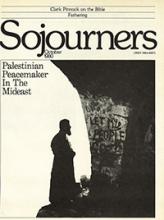The question of the authority and interpretation of the Bible, that indispensable source of the church's knowledge of God's word and revelation, is critical for the church. Although we all wish that debates about the Bible would go away, leaving us to get on with the all-important task of living out its message, a better understanding of its nature and authority is still needed in many parts of the church, and the quest to achieve it cannot be put aside.
In North America, at least in Protestant circles, there is a serious polarization between "liberal" elements, which have let the subject drop out of sight, and "conservative" forces, which have raised the stakes by inflating the categories involved. This has opened a major chasm in popular theology and church life. Somehow we have to transcend this gulf and bring about reconciliation by proposing an understanding of biblical authority which is really comprehensive and satisfying. I believe that the doctrinal model or key which could enable us to heal the rift contains the three elements found in a significant statement of Paul's: "We have this treasure in earthen vessels to show that the transcendent power belongs to God and not to us" (2 Corinthians 4:7).
The Bible is a rich treasure, the word of God, mediated to us in a human vehicle and capable of being, in the power of the Spirit, the place where we can hear God speak to us today.
Read the Full Article

